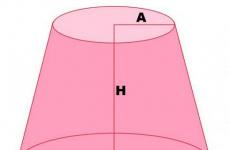The Baptism of the Lord - the history, traditions and customs of the Orthodox holiday. Natural signs for Baptism. Baptism - folk signs
The Feast of the Epiphany is one of the oldest in Christian Church. According to biblical tradition, on this day Jesus, still little known in Judea, came to the banks of the Jordan River, where John the Baptist taught. The baptism of Jesus Christ was marked by a miraculous sign: the heavens opened, and from there a dove descended on Christ.
The word "baptize" in Greek means "I immerse in water." And here the main role is played by water, namely, its symbolic meaning.
A significant day preceding the Epiphany is the Eve, celebrated on January 18th. Before him, all living quarters are thoroughly washed, removed from debris. This is done in order to sprinkle everything clean brought from the church from the festive service. holy water which will save you from evil spirits. After all, Baptism in Russian folk life meant the end of Christmas time and was considered a day intended for the expulsion of unclean people who supposedly appeared on earth during these two weeks, as well as the day of cleansing people from sins.
By the way, the consecration of water is the main event of Baptism. On Epiphany Christmas Eve, water was consecrated in a font installed in the middle of the temple, and on the Feast of Epiphany - in a river, lake, or near a well.
This water was considered holy. It was collected directly from the reservoirs, brought home, drunk and used to make homemade medicines. It is believed that it has healing properties, and is also able to restore vitality, scare away evil spirits, protect from sin.
The owner or hostess, crossing herself, reading prayers, sprinkled windows, doors, corners, all cracks with a wet broom, expelling evil spirits, not allowing her to hide in the house. After that, crosses were placed on the windows and doors. They were drawn with chalk and charcoal or made from thin chips and nailed to the right places. The crosses were supposed to block the entrance of the expelled evil spirits.
Baptism was considered among the people a special day that can bring happiness. For example, they believed that the life of a child baptized on this day would pass in contentment and joy; the matchmaking will be successful, and the wedding arrangement made at Baptism will ensure peace and harmony in the family.
For me, January 19 was a special date all my life. Because it's my birthday. They say that those who were born on Epiphany have a special destiny. Or maybe people themselves came up with it in order to somehow distinguish themselves? Although every year brings me pleasant surprises.
There is also a belief that on the night of January 18-19, the heavens open and all people's prayers reach "directly" to God. And the desires or requests that a person sends to heaven on this night will certainly be heard. I don't know if this is true or not. But it works for me.
Today, after more than two thousand years, not everyone understands the spiritual implication of the holiday. But those wishing to "dive" into the Epiphany ice hole - despite the traditional Epiphany frosts - are more than enough every year. After all, the font is also a symbol, and you need to plunge into it with a certain spiritual attitude, if I may say so.
Tomorrow, January 19, 25 fonts will be waiting for Omsk residents. For the safety of people, employees of the Ministry of Emergency Situations, emergency rescue and medical services, the police department, and the traffic police will also be there.
By the way
Why is it cold in Epiphany?
Frosty Baptism traditions are rooted in climatic features middle of winter. As a rule, during this period, the Asian anticyclone reaches its peak - the mainland high pressure, which covers the whole of Siberia, Yakutia, Central Asia, Far East and, often, the European territory of Russia. Naturally, the coldest thing is in his belly - in Siberia and the territories adjacent to it. Under its influence, relatively dry, calm weather is established in these regions, which contributes to intensive cooling of the surface air layers and, as a result, intensification of frost. Even the sun, which begins to rise above the horizon, does not save from the cold. First, it is still very low and cannot interfere with heat transfer processes. And secondly, up to 70% of its radiant energy is reflected by a thick snow cover. As a result, in the second half of January, the temperature continues to drop and, as a rule, reaches a minimum in the annual cycle. Hence the expression: the sun for the summer - the winter for the frost.
January 19th were born:
- scientist James Watt (1736, the unit of power - Watt - is named after him)
- philosopher Auguste Comte (1798)
- writer Edgar Poe (1809)
- artist Valentin Serov (1865)
- poet Mikhail Isakovsky (1900)
- UN Secretary General Perez de Cuellar (1920)
- singer Jannis Joplin (1943)
- gymnast Svetlana Khorkina (1979)
January 19 in history:
1919 - composer Ignacy Paderewski became the head of the Polish government
1920 - the laying of a monument to Herzen and Ogarev took place
1955 - US President Eisenhower held the world's first televised press conference
1963 - sensational performance of the Beatles on the stage of the London variety theater "Palladium"
1991 - 816,000 tons of oil spilled into the Persian Gulf during Operation Desert Storm
January 19 Orthodox Church celebrates the Baptism of the Lord. Otherwise, this holiday is also called Epiphany. In the Sacrament of Baptism, all three hypostases of the Holy Trinity appeared - the Son, the Father and the Holy Spirit. Read more about the history and meaning of the holiday, as well as the properties of Epiphany water and swimming in the hole, read on.
Why did Christ come to John?
When Jesus was 30 years old, he went to John the Baptist to be baptized by him. This prophet, the son of the priest Zechariah and the cousin of the Virgin Mary - Elizabeth - preached on the banks of the Jordan and called for repentance. The Israelites who came to him and wished to change were immersed in water by John. This was baptism for the remission of sins. Water symbolized the purification of man from the spiritual dirt of the past.
But here an unheard-of thing happens: the sinless Son of God comes to John the Forerunner and asks to be baptized Him. The son of Zechariah sees his own smallness: how can a mortal, sinful person wash the Son of God in water? After all, he is not even worthy to untie the belt on His shoes! John says:
I need to be baptized by You, and do You come to me?
And what does Christ say to him?
Leave it now, for thus it behooves us to fulfill all righteousness
Jesus indicates that this is the will of God.
The double meaning of the Baptism of the Lord
A huge mystery is revealed before John: he sees and hears the three faces of the Most Holy Trinity. First he talked to the Son, Jesus Christ, and baptized Him. I also saw how the heavens opened, the Holy Spirit descended on Jesus in the form of a dove. And at that moment John heard the voice of the Father:
You are my beloved Son, in whom I am well pleased

The Baptism of the Lord itself has two meanings.
- Three faces of the Holy Trinity were revealed to man.
- Christ appears before us as God and man at the same time. The conversion of John and the voice of the Father from heaven testify to the divine nature.
To show that Jesus was incarnated, He, like people, is baptized by John. He has no sins to cleanse them with the waters of repentance. But Christ quietly and humbly enters the Jordan.
Thus, the Son of God and Man shows what people need to do to get into the Kingdom of Heaven. Be humble, pure and bright.
Interestingly, in the Church Charter, the Baptism of the Lord is also called the Day of Lights. In the kontakion for the Theophany of the Lord, Roman the Melodist describes the gospel story. On behalf of John, he addresses Jesus:
I know who You are - Light unapproachable
Visible light descended on Christ (the Holy Spirit in the form of a dove). John the Baptist himself was enlightened and transformed, as a result of which his eyes were able to perceive the revelation of the Most Holy Trinity. Also, each person must change in order to see God.
The Baptism of the Lord in the Iconographic Tradition
There are several iconographic plots on the theme of the holiday.

Usually Christ is depicted in the center. Jesus is standing in the Jordan, on the shallows or immersed in water, His gaze is lowered. From above on Christ in the form of a dove, in a cloud of light, the Holy Spirit descends. To the right or left of Jesus is John the Baptist laying on his hand. FROM opposite side- angels with robes.
In the Byzantine and Old Russian traditions, fish and individual figures were depicted in the water:
- the snake - the water was sanctified by the bodily presence of God the Son, so the evil one cannot stay there;
- men are a symbol of the Jordan;
- women (in Greek the sea is feminine, and this image symbolized the passage of the Israelites through the Black Sea).
The secret of the special properties of baptismal water
And what else happened on this day, besides the appearance of the three Persons of the Trinity? If God entered the water, was it not cleansed? In this rhetorical question lies the answer to the question “Why does the water on the Epiphany have such unusual properties, is it considered healing?” Christ Himself made her life-giving. How could she not be sanctified if the Lord was bodily in her?
It has special meaning: Christ sanctified the water, and through it we also receive grace and commune with the Lord. Therefore, Epiphany water has such amazing properties.

If people accept it with faith and prayer, they receive healing even from serious illnesses. In the old days, with the help of baptismal water, they even checked whether a person was possessed. He was offered to drink from different mugs. The possessed person determined exactly which of them contained holy water, and flatly refused it.
People come to the temple on the feast of the Epiphany and in order to collect baptismal water for the coming year. It is well preserved. It is taken on an empty stomach along with prosphora, and is also given in pure or diluted form to patients.
Swim in the hole?
It is sad to see how the deep theological meaning of the feast of the Epiphany of the Lord is turned into an opportunity to show one's own "I". Internet media, television, radio, newspapers, pages on social networks - they all write about how this or that celebrity jumped into the hole.

The question arises: with what feeling do people do this? If with “Can’t I?”, “We did it, but are you weak?”, “Whoever did not swim in the cold baptismal water is a weakling”, then what kind of faith and deep sense can we talk about a holiday? A person does this out of vanity and pride, to show off and look better in the eyes of others.
If he understands that there is water in front of him, in which the Savior was bodily, if a person prays that the Lord would sanctify him and the action itself would be to purify the soul and body, then this is completely different. It is from such ablution that he will not get sick, but on the contrary, he will recover.
Take it, tell your friends!
Read also on our website:
show more
Completes the cycle of Christmas holidays on January 19 - Epiphany or Epiphany. Why was this holiday called Epiphany, and not the birth of Jesus Christ? The answer is simple: because the present day is the very one on which Christ was baptized and sanctified the nature of the waters.
Baptism is a Christian holiday in which all the rites and traditions are present, passing from generation to generation. The Prophet John the Baptist baptized Jesus Christ at the age of 30 in the Jordan River, sacred to the Jews. Christian legends say that when the Son of God came out of the water, the Holy Spirit descended on him from heaven in the form of a white dove. Since that time, the tradition of baptism in water has appeared.
Epiphany traditions.
The day before the Epiphany, the men went to a nearby reservoir (river, lake) and cut a hole in the ice in the form of a cross, doused its edges with beetroot juice and decorated it with fir branches.
On January 18, the whole family gathered at the table, where there were lenten dishes (mostly kutya, which was prepared from rice, honey, nuts). Then everyone went to evening worship, before which they usually took communion and confessed.
After the priest dipped the cross into the reservoir, the water in it is considered sacred and all people go to plunge into the hole. After reading a prayer, a person enters the water and plunges three times.
It is believed that on this day, by plunging into the water, people are healed of serious illnesses and free their soul and body from sins.
 Epiphany water has magical properties. It is collected in a clean glass jar. Miraculously, the water does not deteriorate for many years. It is used to illuminate temples and dwellings, kept in the house behind the icons and drunk three sips before prayers and during periods of poor health. Girls washed themselves with holy water to preserve their beauty and health. Some priests believe that there is no the best medicine than holy water.
Epiphany water has magical properties. It is collected in a clean glass jar. Miraculously, the water does not deteriorate for many years. It is used to illuminate temples and dwellings, kept in the house behind the icons and drunk three sips before prayers and during periods of poor health. Girls washed themselves with holy water to preserve their beauty and health. Some priests believe that there is no the best medicine than holy water.
What needs to be done before diving into the hole?

The first thing you need to do is warm up. You can do a little exercise or jog. Take a change of shoes with you, in which you will approach the bathing area, and which will be easy to remove. Do not jump into the water from the shore, enter the pond gradually along special steps. After dipping with a dry towel, thoroughly rub the body.
All residents of Kherson (parents and their hardened children) can take part in the mass swimming in the ice hole, which will take place on the embankment along Ushakov Avenue and O. Fedorov Embankment.

On this frosty day, we want to congratulate all people on the feast of the Epiphany of the Lord! May your soul be filled with goodness, and your heart with love, and may holy water wash away all your problems and sorrows and give you good health and happiness. Peace to your home!
The Baptism of the Lord is one of the twelve main Christian holidays. It completes the series of Christmas holidays. The main symbol of the feast of Epiphany is water. Due to the importance of the day, the editors of hochu.ua have prepared information about the traditions and customs of Baptism.
AT church calendar January is important date- Epiphany 2018. This holiday, like others during the winter celebrations, is considered a favorite, and also has cultural traditions. Due to the increased attention to the day, we publish information about the traditions, customs and signs of Epiphany 2018.
It is believed that on the night of the 18th to the 19th, she acquires special healing properties. On the eve of the holiday, frosts are always expected, which they called "Epiphany". The days on which Epiphany falls correspond to the end of the pagan holiday of the winter solstice, associated with the "birth of a new Sun" - an increase in daylight hours.
Baptism of the Lord: the history of the holiday
Catholics celebrate the feast of the Baptism of the Lord on the 6th, and Orthodox believers on January 19th. The holiday was established in the second half of II Art. and at first it was celebrated at the same time as Christmas. Their separation occurred after the IV Art. In Ukraine, Epiphany is first mentioned in the Ipatiev Chronicle of 1114. This holiday is associated with the baptism of Jesus Christ in the Jordan River. During his lifetime, more than two thousand years ago, only adults were baptized who consciously accepted faith in the one God. In those days, Christians were persecuted, and monotheism was rejected.
When Jesus was 30 years old, he came from Galilee to the Jordan River. In the waters of this river, John the Baptist baptized people, calling on everyone to repent and through this rite to purify the soul and body. The baptism of Christ meant that he took full responsibility for fulfilling what he was destined to accomplish during his earthly life. This event can be considered the first in his social activities. Another of the names of the holiday is Epiphany, since at the baptism of Christ the world appeared Holy Trinity: "God the Father spoke from heaven about the Son, the Son was baptized by the holy Forerunner of the Lord John, and the Holy Spirit descended on the Son in the form of a dove."
Traditions of the celebration of Epiphany

On the eve of Epiphany, January 18, believers fast during the day, and in the evening they celebrate the second Holy Evening or “Hungry Kutya”. The whole family, as on Christmas, gathers at the table. Lenten dishes are served for dinner - fried fish, dumplings with cabbage, buckwheat pancakes in butter, kutya and uzvar On Epiphany, a festive service is celebrated in the church. According to tradition, during the Jordanian worship doves are released into the sky - they symbolize the Spirit of God who descended from Heaven on Christ in the form of a dove, as well as the fact that the Christmas holidays have come to an end and they should be released. In memory of the fact that Christ consecrated water with his Baptism, on the eve of the holiday, water is consecrated in churches, on the very feast of the Epiphany - in rivers or other places where water is taken.
On the eve of the holiday, men cut a hole in the ice in the form of a cross, and the ice cross itself is set nearby. Sometimes it is decorated with periwinkle and pine needles, or watered with beetroot kvass, which makes it crimson red, symbolizing fire. Above the river near the cross, the rite of the Jordanian water blessing takes place. During this rite, the priest lowers the cross and the lighted three candlestick into the hole three times - water is baptized with fire.
According to tradition, on Epiphany (after Epiphany frosts), young people have fun on the ice: they go skating and arrange carousels. Since it was possible to carol until the Meeting of the Lord (February 15), on this holiday they again went around the houses, caroled and sang songs, congratulating each other. After the feast of the Epiphany, boys and girls could again gather at the “vechornitsa”, where young people looked at each other and chose a mate for themselves. And from Jordan (another name for the feast of Baptism) to Lent lasted new season weddings.
Folk omens for baptism
A person baptized on this day will be accompanied by happiness all his life.
It was considered a good omen if they agreed on a future wedding on that day. "Epiphany handshake - to a happy family."
Any agreement ending in a handshake promised further support from above.
If it snowed that day, it foreshadowed a good harvest.
If on Epiphany the trees were covered with frost, in the spring they tried to sow winter wheat on the same day of the week - the harvest would be rich.
A clear day at Epiphany promised, according to folk signs, a lean year.
If there is a full moon on the night of Epiphany, then they feared a flood in the spring. This year, Epiphany falls on the 4th moon phase, i.e. do not expect a big flood in the spring.
The girls washed their faces Epiphany ice and snow, they said that then they would be "white without white, ruddy without rouge."
Dreams on Epiphany night were considered prophetic, and fortune-telling was similar to Christmas.
living water

On the morning of January 19, water is blessed - in a church or near a lake, river or stream. It is believed that on this day, from midnight to midnight, the water acquires healing properties and retains them throughout the year. It is given to drink to the seriously ill, churches, houses and animals are consecrated with it. Epiphany water is credited with the ability to purify and heal diseases of the body and soul, wash away the accumulated negativity. Since ancient times, people have denoted eternity, outer space, the line between worlds with water (for example, in myths Ancient Greece the dead were transported to the other world across the river Styx with the help of the ferryman Charon).
The symbolic crossing to the other side of the river in the songs and fairy tales of the Slavic peoples means marriage, marriage (the transition of a person from one state to another). This idea was also reflected in one of the Andreevsky divinations. When water was poured into the bowl, several straws were placed on it, which symbolized the bridge, and left under the bed for the night. Water was credited with magical and healing effects. Water, like fire, is capable of cleansing on a physical and spiritual level. To calm the person, they give him a glass of water to drink. If you had a nightmare at night, they are advised to tell it to the water flowing from the tap, which, after listening, will take it out of your life. Pouring cold water able to relax and “wash away” certain blocks.
P.S. It is interesting that although riverbeds (water in motion) need to shape their flow, due to mountains, canyons, stones, etc., water itself has the ability to form (for example, a male body). Take a closer look at the structure of professional swimmers and divers, they have pronounced broad shoulders and narrow hips. At Epiphany, water is sanctified by fire. The word "I baptize", "I baptize" in Greek means "I immerse in water." In this rite, male and female essences meet again. Which once again reminds us that when interacting, two opposites (a man and a woman) form and create each other, and are also able to give birth to a new life.
Epiphany is one of the 12 most important Orthodox holidays, completing the period of Christmas time, which began with the Nativity of Christ on January 7th.
As with any holiday on Epiphany, there are a lot of traditions, customs and signs. However, the most important thing on this day is water, because it was in it that Jesus Christ was baptized.
The editors of the site have prepared for you the most important customs and traditions that must be observed on this day.
history of the holiday
Orthodox Christians have been celebrating Epiphany for more than 2,000 years in a row since John the Baptist baptized the son of the Lord Jesus Christ in the Jordan River.
It is believed that after the rite of baptism was completed, the holy spirit descended to the people in the form of a dove and everyone listened to God's voice, which said: "You are my beloved son; my good will is in you!"
After baptism, Jesus set out on a journey. For 40 days he wandered in the desert, preparing himself for a sacred duty. Returning back, the son of the Lord sacrificed himself for the sake of the people and resurrected on the day that is now commonly called the Resurrection of Christ or Easter.
Like Christmas, the feast of Epiphany has its own Christmas Eve. It is also called the hungry holy evening. The fact is that at this time it is already necessary to fast and all the dishes on the table should be lean. On this day, the last kutya is prepared, which ends the Christmas holidays. In addition to it, uzvar, dumplings, pancakes should be present on the table.
Traditions and customs
As already mentioned on this day, all traditions are connected with water. Now, of course, everyone will say that on Baptism it is necessary to plunge into the hole and draw sacred water.
Let's start with swimming. It is believed that best time for bathing is the night of January 19, when the priest, after the evening service, blesses the water in the reservoir. However, those who did not have time to swim can do this throughout the entire feast of Epiphany.
At the same time, you also need to dive into the hole wisely. This is done only after a special Jordan in the form of a cross is cut through the ice, and the priest lowers the crucifix into the water and reads a prayer. You need to dip three times, but preferably not with your head, otherwise it can lead to a sharp decrease in temperature and pressure drop.
Bathing in reservoirs on this day cleanses the soul and body, protects a person from various evil spirits, as well as diseases.
So that the water does not lose its sacred power, it also needs to be dialed correctly. Our ancestors believed that at midnight on Epiphany, in general, all water becomes holy. If you collect it, then such water will stand whole year and not lose their medicinal properties.
The main rule in this case is the purity of the container into which water is collected. It should not be stored in liquor or plastic bottles. Previously, housewives had a special jug where they collected baptismal water, clogged the vessel and carried it to the cellar. She was used for a whole year for any illnesses, and she always helped.
What not to do on a holiday
Along with the traditions of Baptism, there are many prohibitions. The main one is a ban on any work - you can’t cook, clean, build, and so on, as well as do needlework. The whole holiday should be devoted to cleansing the soul from all the sins that have accumulated over the year.
It is also imperative not to swear, not to gossip, not to slander, and not to complain about your fate and the people around you. it is not recommended to arrange wild festivities and magnificent feasts, since the Epiphany fast is one of the most stringent and must be adhered to.
It was believed that after Epiphany, the winter frosts were already on the wane. Ukrainians liked to say at this time: "Three, do not tremble, but Vorokhreschi have already passed!"
Folk omens
On this day, people especially watched the weather, and from it they could determine what the whole coming year. Wherein folk beliefs they say that the signs noticed in Baptism are the most faithful and everything that happens on this day must be paid special attention.
Among the most common signs are:
- if the weather is clear and frosty on this day, we should expect a drought in the summer;
- if it is cloudy and snowing outside, then a bountiful harvest awaited people;
- if at Epiphany noon blue clouds were observed in the sky, then the year should again be fruitful;
- if a full moon fell on Epiphany, then until the end of January the weather will be the same as the next three days after the holiday;
- if it rains, then the end of January will be cloudy and rainy;
- a cross painted on the door of the house will protect the family from evil spirits;
- barking dogs at night is a harbinger of good news.
Epiphany divination
Favorite entertainment unmarried girls there was a divination at baptism. Now they say that it is impossible to guess on this holiday, since you can guess the fate for the worse. We will give you some of the most common ways to find out your fate, and it’s up to you to choose whether you do it at Baptism or not.
Divination with sounds. On a moonlit Epiphany evening, the girls went to the church and listened to the silence under the door. If they heard a wedding choir, it was worth waiting for an imminent wedding, and if a funeral service - a funeral.
There is a similar divination, but a bell is used for it. By its sound, they determined what the next year promised. So, if the ringing was sonorous, then this is for marriage, deaf - for imminent death.
Divination on bread with a ribbon. In an empty pot you need to put a piece of bread and a ribbon. Whatever you pull out blindfolded first is waiting for you this year. The ribbon symbolizes the arrival of matchmakers, and the bread means that the fortuneteller will sit in girls for another year.
Divination on paper. A sheet of paper must be crumpled and then set on fire. After it completely burns out with a candle on the wall, you need to create its shadow. What it will look like, this year, you have to wait.
Fortune telling in the snow. This year, some snow fell in Ukraine, so you can try to tell fortunes on it. In the evening, the girls fell backwards into the snow. Already in the morning they looked at the left trace. If it was smooth and even, then the character of the future husband will be good. If the snow turned out to be cut, then the spouse may turn out to be pugnacious.
Fortune telling on buns. A group of girls gathered in the house, you had to have a bun with you. The pastries were laid out in one row and launched into the room to the guessing hungry dog. Whose bun he eats first, she will marry this year.






